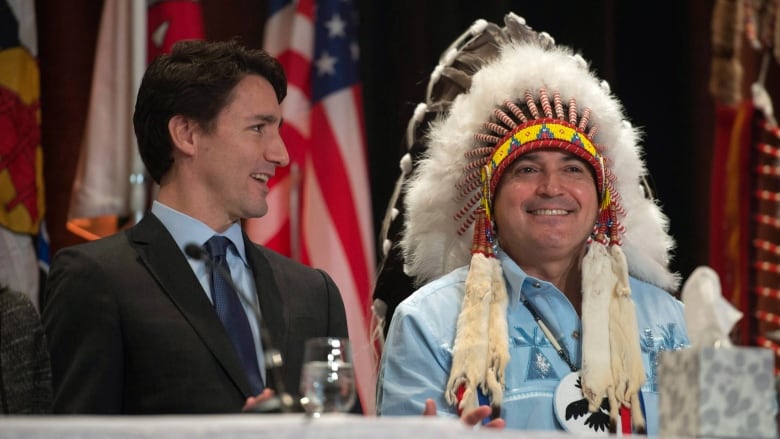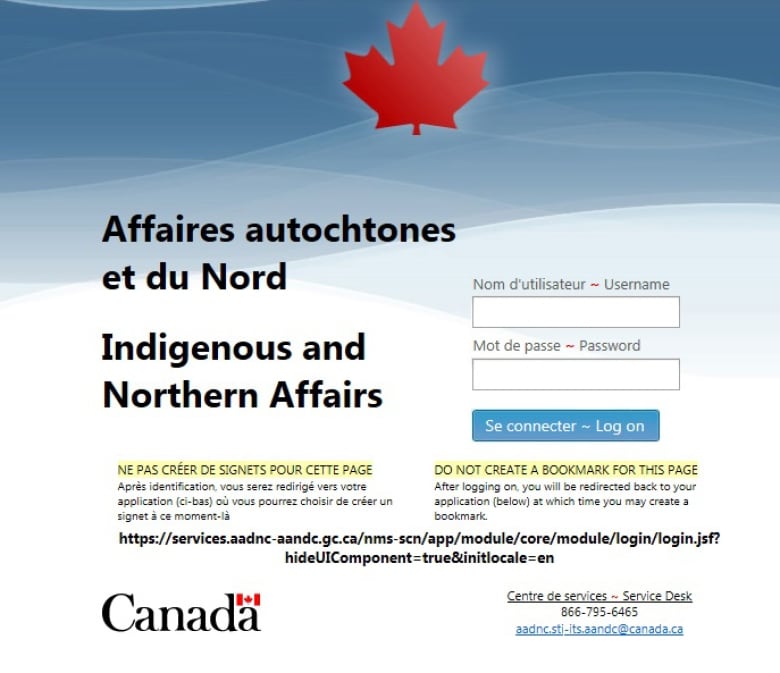Vaunted First Nations jobs plan misses target inside Indigenous Affairs Ministry
Promise of government jobs for Indigenous people falls short inside key federal department

The Liberals' vaunted support for First Nations, Métis and Inuit job-seekers appears to be absent in the government's own hiring practices.
Indigenous and Northern Affairs Canada went on a hiring spree this year — and so far there are relatively few Indigenous workers among the lucky recruits for stable, full-time jobs.
In a 1996 written agreement with First Nations, the department promised to "make every reasonable effort" to hire one Indigenous employee for every two new job vacancies.

The Liberal government of Justin Trudeau has since opened the jobs spigot, with plans to hire 278 people in the department this fiscal year alone to help administer new water-quality and infrastructure programs, among others. Another 184 jobs will be created in the following three years.
'Extremely frustrating'
But of the 117 new workers hired so far, just 21 are self-identified Indigenous people.
That works out to 18 per cent, far fewer than the long-standing promise of 50 per cent. It's even lower than the current makeup of the department's 4,100-member workforce, which is about 30 per cent Indigenous.
"For me it is extremely frustrating, not just as an individual who is more than qualified and looking for a career," said a First Nations woman with two degrees who has repeatedly applied without success for full-time work at the department.
"But on a larger scale, I find it frustrating for all Indigenous people and for Canada as a whole. Here we have a new government that talks about a nation-to-nation relationship and engagement and all that good stuff.
"But wouldn't the best way to start that process be to hire more Indigenous staff who are passionate about working with the government and their people to bridge gaps and make positive changes?"
CBC News has agreed to withhold the identity of the woman because she worries any publicity will damage her job prospects.
A spokeswoman for Carolyn Bennett, the minister responsible, confirmed the 50 per cent hiring target still stands, as the government works on "advancing reconciliation" with Indigenous people.
It seems like the whole 50 per cent policy is just lip service.- Frustrated First Nations woman seeking a job at Indigenous and Northern Affairs Canada
"We know there is work to be done to ensure we achieve this target, and the department continues to explore all avenues for ensuring it is met," Sabrina Williams said in an email. She gave no further details.
Employment at the department hit a peak of 5,073 in 2011-12, just before the Conservative government tabled a deficit-cutting budget that over the next three years chopped more than 900 of those jobs.
Indigenous employment levels, meanwhile, have fallen to about 29 per cent of the workforce at Indigenous and Northern Affairs, from 31 per cent a decade ago.
A department spokesman said that despite the 50 per cent target, "there is no defined quota for this round of hiring."
"Hiring managers have the discretion to use various means … to determine the staffing strategies that best suit their needs," said Shawn Jackson.
The Public Service Commission of Canada in March this year compiled an online inventory of job-seekers called Careers of Aboriginal People, listing 662 Indigenous persons with post-secondary degrees who are actively looking for federal government work. Potential applicants were able to submit their resumés starting in September 2015, with a cut-off date of March 15 this year.
But a department insider said managers rarely consult the inventory, or even know it exists: "The managers are just feeling the pressure to staff quickly, so they stick with the methods they are familiar with."
'Super frustrating'
Officials caution that Indigenous workers are asked to self-identify, as prescribed in the Employment Equity Act, so that actual numbers may be different from reported numbers. A 2005 report by an Indigenous group cited evidence that some workers may be falsely self-identifying as Indigenous, while others with genuine First Nation origins may not so declare.
The First Nations woman who has still not found a permanent job with the department says the experience has undermined her faith in the government.

In its March 22 budget, the Liberal government unveiled a raft of programs for Indigenous people, part of an election commitment to reconcile with First Nations people after more than a century of abuse, discrimination and neglect. Among the programs was $15 million for a two-year training strategy to improve job skills.
Follow @DeanBeeby on Twitter

